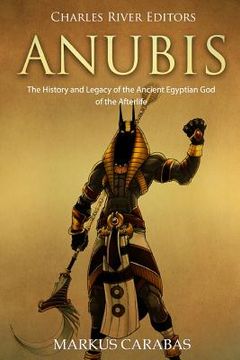Anubis: The History and Legacy of the Ancient Egyptian God of the Afterlife (en Inglés)
Reseña del libro "Anubis: The History and Legacy of the Ancient Egyptian God of the Afterlife (en Inglés)"
*Includes pictures *Includes ancient accounts *Includes online resources and a bibliography for further reading "When Nephthys gave birth to Anubis, Isis treated the child as if it were her own; for Nephthys is that which is beneath the earth and invisible, Isis that which is above the earth and visible; and the circle which touches these, called the horizon, being common to both, has received the name Anubis, and is represented in form like a dog; for the dog can see with his eyes both by night and by day alike." To the ancient Egyptians, as was the case with any society made up of inquiring humans, the world was a confusing and often terrifying place of destruction, death and unexplained phenomena. In order to make sense of such an existence, they resorted to teleological stories. Giving a phenomenon a story made it less horrifying, and it also helped them make sense of the world around them. Unsurprisingly, then, the ancient Egyptian gods permeated every aspect of existence. Given the abundance of funerary artifacts that have been found within the sands of Egypt, it sometimes seems as though the Ancient Egyptians were more concerned with the matters of the afterlife than they were with matters of the life they experienced from day to day. This is underscored most prominently by the pyramids, which have captured the world's imagination for centuries. Thus, it's little surprise that Anubis was one of the most important gods in the Egyptian pantheon. The image of Anubis, with his jet-black jackal's head downturned in merciless judgment, continues to inspire artists and neo-Pagans today. There is something about this somber figure that has made him stand the test of time and allowed him to survive while so many gods and goddesses have fallen from memory in the wake of newer religions that are aided by a more interconnected world. Perhaps it is because Anubis is associated with death, or maybe it's because the lack of references to him in Egypt's literary and archaeological record invites multiple interpretations. It also may be due to his appearances in the most emotive works of ancient Egyptian art, notably the vignettes from tombs depicting the mysterious journey of the dead, which beckon viewers to imagine an unearthly, poetic view of death so far removed from modern conceptions. In a sense, Anubis is both awful and majestic. To the ancient Egyptians, however, Anubis evolved over millennia, and even though his image may strike fear into modern hearts, in ancient times, his appearance was somewhat comforting to those who feared the invisible spirits inhabiting all things beside the Nile. Just as the dog is today a figure of protection against violence and trespass, so too was Anubis a figure whose fearsome aspect was a source of comfort for those following the code of their religion, ensuring their piety would be defendable in the Hall of Justice at the end of their lives. How his image was taken up by later cultures, ones who were not acolytes of the ancient Egyptian religion, is fascinating and a testament to human imagination. Anubis: The History and Legacy of the Ancient Egyptian God of the Afterlife looks at the god that had such a decisive impact on the Egyptians' concepts of death and afterlife. Along with pictures depicting important people, places, and events, you will learn about Anubis like never before.

